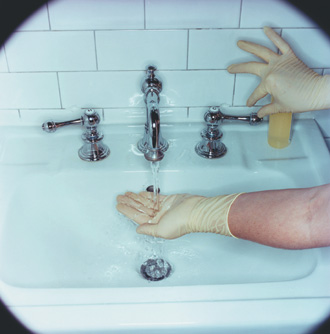 Don't touch that DialŪ!
Don't touch that DialŪ!
The surface of your skin contains a microbial ecosystem. If you're always washing, that ecology will be disrupted.
Q: Question for biology professor Joan Slonczewski: Recent studies in Pakistan and Bangladesh suggest that something as simple as washing your hands properly could save your life. But is it possible to overdo it? Do the antibacterial soaps on the market offer a real advantage over plain soap, or are they just providing a false sense of security? Worse, could we be sanitizing ourselves to death?
A: Hand-washing is fine--in moderation. There are some very general studies suggesting that people who have been raised in overly clean environments are more likely to have asthma or multiple sclerosis. I think the correlations are mainly statistical, but there is some suggestion that too little exposure to germs, to potential pathogens, leads to failure to develop a strong immune system.
The surface of your skin actually contains a lot of bacteria, a bacterial ecosystem, or I should say a microbial ecosystem, because there are yeasts and other fungi as well. But mainly there are bacteria that live off the oils from your sweat glands, and they produce mild acids, things like lactic acid, that you find in yogurt, or acetic acid, that you find in vinegar. These acids actually deter the growth of pathogenic bacteria.
If you're always washing your skin, that ecology will be disrupted, and you'll get skin disorders. That can be a problem for surgeons, who have to wash their hands all the time. The main point of washing is that you're diluting and removing the organisms from your skin, and that's going to be effective whether you use antibacterial soap or not. The disease-causing bacteria are unlikely to be tightly associated with your skin, unless they're specifically a skin pathogen. But if it's a cold virus or a salmonella, it's not going to be tightly associated with your skin, and so the idea of hand-washing is just to wash it away. The antibacterial agent may or may not kill the microbe, but once it's washed away, it's not going to affect you.
So using antibacterial agents would be of less significance than whether or not you wash your hands. The reason soap would be helpful is that soap increases the solubility of the materials on your skin, so you're going to pull more bacteria off the skin if you use soap than if you don't. I'm not sure how the term "antibacterial" is defined commercially. If "antibacterial" means "antibiotic," such as molecules that specifically target bacteria in very low concentration, then certainly there's no benefit to those in soap. If it's an antibiotic, it wouldn't have any effect on a virus, and most respiratory infections are caused by viruses.
A study on water filtration was done in Bangladesh by researchers interested in decreasing the incidence of cholera. They found that cholera bacteria were preferentially associated with copepods, which are tiny invertebrate creatures. The villagers have access to pond water, which is like a soup of microorganisms. But they found that the women could filter the water with used sari cloth and cut the incidence of cholera and other diseases by half. That was a case where a very low-tech measure was found to have an enormous effect on health.
I just wash my hands with plain water, except for once or twice a day. I avoid soap because I don't want my hands to dry out.
Professor of Biology Joan Slonczewski is a leading expert on Escherichia coli bacteria whose research has been supported by the Howard Hughes Medical Institute, the National Science Foundation, and the National Institutes of Health. She is also a prize-winning science-
fiction novelist.
Do you have feedback on this page?
